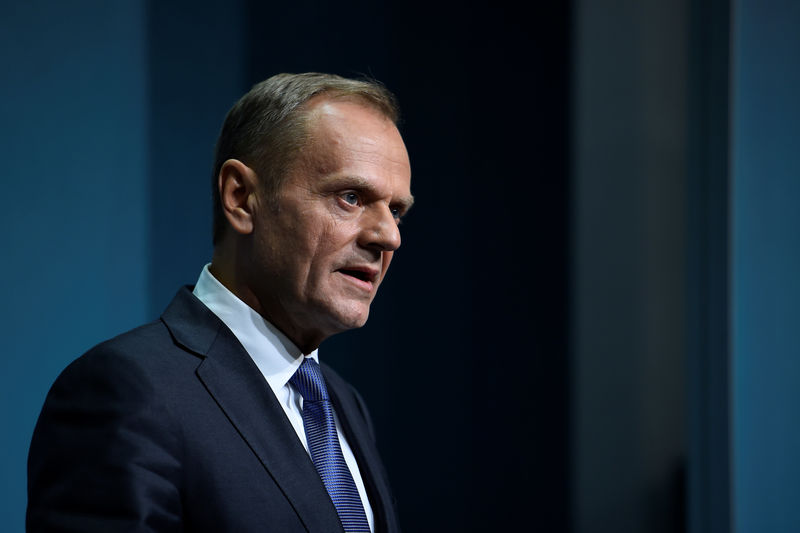 © Reuters. President of the European Council Donald Tusk arrives at a press conference at Government buildings in Dublin
© Reuters. President of the European Council Donald Tusk arrives at a press conference at Government buildings in DublinBy Jan Strupczewski and Alastair Macdonald
BRUSSELS (Reuters) – A return to good times for Europe’s economy may be sapping will to reform the euro zone before talks even start, so investors will be watching closely next Friday when EU leaders discuss how to deepen cooperation to protect against any return to crisis.
“In the absence of market pressure, the collective political will to make further progress has weakened,” European Council President Donald Tusk cautioned in a letter, seen by Reuters, that invites the 27 leaders to the Dec. 15 euro summit.
The euro zone economy is set to grow at its fastest pace in a decade and unemployment is at eight-year lows. Despite the economic success, the bloc faces strong anti-EU sentiment among voters, expressed in Britain’s decision to leave in 2019.
Weakened by Britain’s departure, the EU also has to face the rising economic power of China, increased global protectionism, migration challenges and tensions with Russia. The best response to these risks is increased EU unity, top EU officials say.
The European Commission proposed on Wednesday ideas for deeper integration of the 19 countries that share the euro that will feed into the leaders’ discussions next week.
But it was also careful to leave the door open for eight non-euro countries to join all the initiatives to help unite the broader European Union around the single currency, which all except Denmark — and Britain — are obligated to adopt one day.
But while all the 27 governments that will remain in the EU agree a stable and shock-resilient euro zone is in everybody’s interest, they differ on what needs to be done and how quickly.
Top EU officials in Brussels have underlined that it is time to “fix the roof is when the sun is shining”, calling on leaders to take advantage of the fastest economic growth and a less busy election agenda across the bloc to commit to reforms.
But Jeroen Dijsselbloem, the outgoing chairman of euro zone finance ministers who will do most of the work on euro zone reform before leaders take final decisions in June 2018, warned last week of growing complacency.
“Things are going so well, the banks are better, the economy is better, I see too many politicians relaxing and really we need to do more work,” he said.
The 27 EU leaders will be asked next Friday to give their finance ministers the go-ahead to work on the various reform ideas, which include setting up a euro zone fiscal capacity and creating the post of a European minister of economy and finance.
Other reform topics include a simplification of the EU’s fiscal rules and turning the euro zone bailout fund into a European Monetary Fund, which would also be a financial backstop to a bank resolution fund.
Finally the leaders will be asked to say how they would like to approach the gradual introduction of a European Deposit Insurance Scheme that would boost the euro zone banking sector.
Except for mandating further work on the various reforms and spelling out which ones should have priority, the leaders will not take any decisions next week, not least because of sharply differing views on most of the topics and the lack of a mandated government in the bloc’s biggest member Germany.
(Writing By Jan Strupczewski; Editing by Alastair Macdonald and Toby Chopra)
Source: Investing.com


























